 The
Chandos Portrait
The
Chandos Portrait 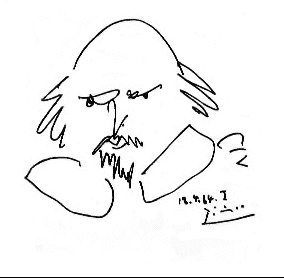 by Picasso
by Picasso  The
Chandos Portrait
The
Chandos Portrait  by Picasso
by Picasso
What Did Shakespeare Look Like?
Shakespeare II
En 214 (formerly En 356)
Dr. Richard Regan
Spring 2013
Course Objectives (IDEA Center)
Essential: Gaining a broader understanding and appreciation of intellectual/cultural activity (#7)
Important: Learning to analyze and critically evaluate ideas, arguments, and points of view (#11)
Important: Developing skill in expressing yourself in writing (#8)
This course studies the second half of the career of William Shakespeare, generally considered the greatest writer in the English language. We focus on mature comedies, sonnets, tragedies, and Shakespeare's final form, the romances. Shakespeare is a great wordsmith, and we concentrate on his language through a multimedia style of presentation. I'll project the text on one screen while we watch a production on another, next to the text. The books I have chosen (the Signet Classics) also give us a clear focus on the words of the play, and have helpful notes at the bottom of each page.
Each week I'll ask you to email me a short response paper where you evaluate 3 points made by a critic (or critics), essays found in the back of the individual Signet editions. And if you mark passages in your books as we do them in class, you'll have notes on all you need to study for the quote tests which form the major part of your grade. Another major project is an optional "contract" paper where you explore your own ideas about a play, its characters, or dramatic structure. Completion of this paper makes you eligible for a grade of A or A- in the course.
Shakespeare's work teaches us about our own human natures. As many psychologists, philosophers, theologians, historians, and scientists have observed, Shakespeare has acute powers of observation. We see in his plays how people behave, how they feel. how they act politically. And we understand ourselves and our own world better, even as we learn about the Renaissance, or Early Modern era.
Office
hours: Monday
3-4, Wednesday 3-4*, Thursday 3-4,
and by appointment.
* committee meetings cancel some Wednesdays
Texts: Signet Classic editions of the plays listed below.
Grading: Three tests and an optional paper, each of equal weight in the final grade.
Modified contract: an 8-10 page optional paper to be eligible for a grade of A or A-. Papers may be rewritten after a conference. Topics must be in writing and approved in conference.
Required: 1) two tests based closely on the texts of the plays and a final exam; 2) weekly summaries/responses to critical articles or WWW sites. These are graded as quizzes and can raise or lower the final grade.
Attendance: for every three cuts, a point will be deducted from your semester average. Excused absences may be arranged with the professor. Excessive absences may result in a failing grade.
You should submit your papers electronically, written in Microsoft Word. Word has a feature called Track Changes which we can use to write comments on papers (in color). Click here to download a document that contains some suggestions for writing in Word and for emailing papers as attachments.
Final Exam: essays and passages for analysis.
Students with documented learning disabilities, please see me. Alternative methods of testing and evaluation are available.
Course description:
In the second half of Shakespeare's career, we study an amazing variety of sonnets, mature comedies, tragedies, and romances which express both the spirit of the Jacobean age and their own identities as different genres which reference each other. As You Like It, Twelfth Night, the Sonnets and Julius Caesar begin the course as a preparation got the great tragedies: Hamlet, Othello, and King Lear. Antony and Cleopatra is a fascinating bridge between tragedy and the last plays, the romances. We will learn how critics have approached Shakespeare in many different ways, and how to evaluate and respond to critical opinion. Multimedia presentations will show how performance and text combined enrich our understanding of this great writer.
Some fine Shakespeare productions can be viewed from this Library link:
http://ativ.alexanderstreet.com.libdb.fairfield.edu/Search/PersonID/219589/tab/video
Macbeth, with Anthony Sher
Measure for Measure, 2006 film
Hamlet, with Kevin Kline
The Taming of the Shrew, American Conservatory Theater
King Lear, with James Earl Jones
Much Ado About Nothing, New York Shakespeare Festival
Powerpoint Slide Shows from Hardy Cook and the Shaksper archives
Shakespeare's Life
Shakespeare's Theater
Shakespeare's Texts
The Elizabethan World Picture
Theater related websites
"The Elizabethan Theatre": a lecture with slides
Designing Shakespeare (home)
Designing Shakespeare (digital resources)
Shakespeare in Performance Institute Acting Exercises
Terry Gray's Mr. William Shakespeare and the Internet
Encyclopaedia BritannicaWas Shakespeare Shakespeare? The Authorship Controversy
The Shakespeare Discussion List Archive
Teachers FirstPolydore Vergil's Anglica Historica (1555)
Podcasts
American
Shakespeare Center
The ASC offers a number of different podcasts, including This Week at the
Blackfriars, the Blackfriars Backstage Pass, the American Shakespeare Center
Chronicles, and Doctor Ralph Reveals All.
You can find links to all of these podcasts at the American Shakespeare Center's
Podcast Central; you can also subscribe to all ASC podcasts through the iTunes
Music Store Podcast Directory, or through any number of web-based podcasting
sites, including Podcast
Pickle.
American Shakespeare Podcast Central (Blackfriars Playhouse)
Mobile Phone Shakespeare
iTunes Store: Search <Shakespeare> for a free app for the iPhone with searchable text
Mobile Open Source Shakespeare
Here are the instructions for viewing the Class pages and video clips. You'll need a password from Dr. Regan: rjregan@mail.fairfield.edu
Streaming
video is a part of the course because I've written classes to be interactive
with excerpts from performances. You will need a broadband internet connection.
Cable or DSL will work. Satellite is probably OK too. Dialup is too slow for
video.
As you scroll down the course page, for each of the plays you will see a link
called "Click." That will take you to the Class, and when you click
on a video clip you will see a password box. The password will be given out
in class, a security measure because the TEACH Act passed by Congress in 2002
allows only enrolled students to have access to copyrighted materials for educational
purposes. Our method of streaming will open the clip on your computer in QuickTime,
though if you are a Windows user RealPlayer may open it instead. QuickTime comes
standard on Macs, and if you Windows users do not have it, you can download
it (bundled with iTunes) from:
http://www.apple.com/itunes/download.
These video clips are also available from iTunes University, together with audio podcasts of our classes and some documents for each play. The clips can be expanded to full screen. Documents can be viewed as .pdf files only in iTunes, but the audio and video files can be synched to your iPod. If you are on the class roster, you have access through:
Enter your NetID number as your user name. The password is your NetID password. This login will work as soon as the class begins.
If you are a Windows user, you can get iTunes free at:
http://www.apple.com/itunes/download/ (scroll to the Windows links)
Schedule
Week of:
January 21 - Introduction
to Comic Theory
and As You Like It
(Monday is MLK Day)
Read the Works of Shakespeare at MIT
The Internet Shakespeare Editions
January 28 - As You Like It
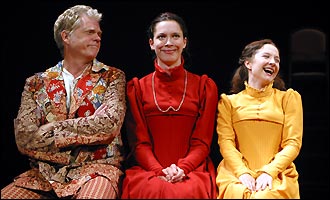
Read: the play and the Signet Introduction, and the articles by Gardner, Erickson, and Howard
CLICK to go to the class on the play.
"Instruction Versus Deception: from Rosalynde to As You Like It"
"Orlando and the Golden World: the Old World and the New in AYLI"The Works of the Bard: including a SEARCH engine
Scanning
Shakespeare's Lines
(click on Teacher's Guide, then Scansion Guide)
February 4 - Twelfth Night

Read: the play and the Signet Introduction, and the articles by Bamber, Kimbrough, and Howard
CLICK to go to the class on the play."Trevor Nunn's Twelfth Night": Contemporary Film and Classic British Theatre"
February 11 - Sonnets
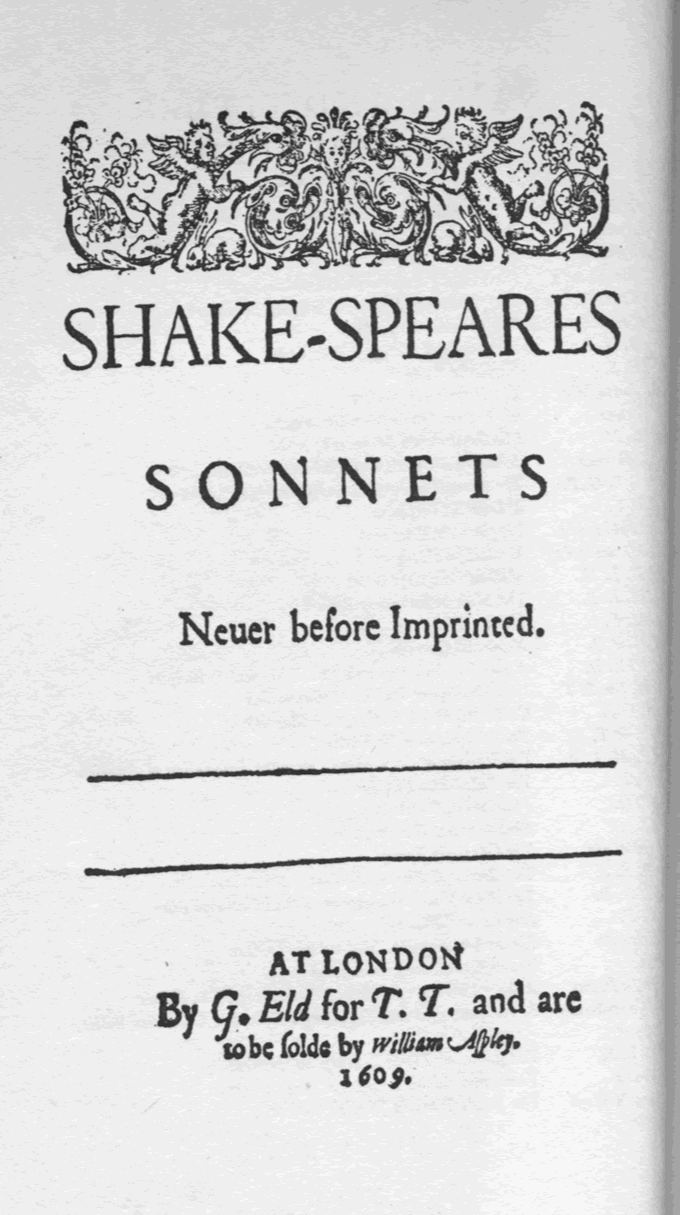
Read: the poems and the Signet Introduction, and the articles by Empson, Smith, and Nowottny
"The amazing web site of Shakespeare's Sonnets"
Shakespeare's Sonnets (1609): A Guide to Electronic Texts
Was Shakespeare Shakespeare? The Authorship Controversy
February 18 - Julius
Caesar
(Monday holiday)
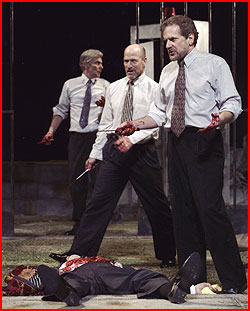
Read: the play and articles by Mack and Kahn
CLICK to go to the class on the play.
PAPER TOPICS
"Caesar"s Reviving Blood: Shakespeare and the Religion of Revolution"
William Shakespeare's Julius Caesar (from Perseus at Tufts)
"An English Renaissance Understanding of the Word 'Tragedy'"
February 25 - Hamlet

Read: the play and the Signet Introduction
CLICK to go to the class on the play.
EXAM
"Shakespeare and the Public Discourse of Sovereignty: 'Reason of State' in Hamlet"
"Who Knows Who Knows Who’s There? An Epistemology of Hamlet (Or, What Happens in the Mousetrap)"
Read: articles by Mack, Ornstein, Heilbrun, and Belsey
"Multiplicity of Meaning in the Last Moments of Hamlet"
Hamlet on the Ramparts (see "Films")
"'Too Much in the Black Sun': Hamlet's First Soliloquy, A Kristevan View
"An English Renaissance Understanding of the Word 'Tragedy'"
SPRING HOLIDAYS
March 18 - Othello
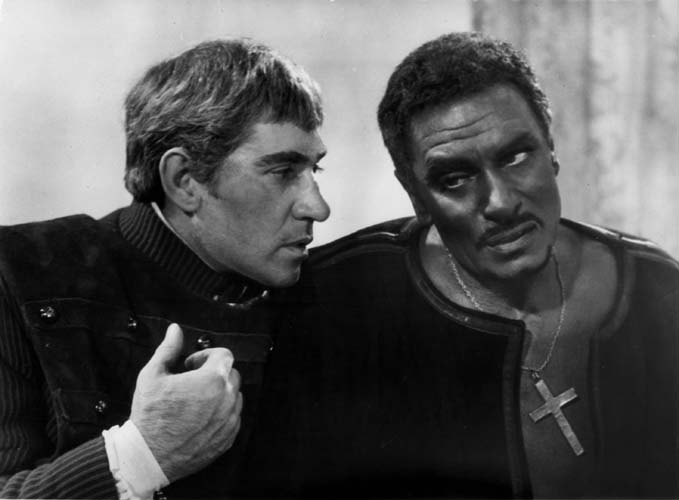
Read: the play and the Signet Introduction, and the articles by Mack and Sprengnether
CLICK to go to the class on the play.
"'That Which Heaven Hath Forbid the Ottomites':The Turks in Shakespeare's Othello"
Shakespeare on Screen: Threshold Aesthetics in Oliver Parker's Othello
(access to video clips)
Cinthio's Tale: The Source of Shakespeare's Othello
Bibliography on Shakespeare's Women
March 25 - Measure
for Measure
(Thursday holiday)

Read: the play and the Signet Introduction, and the article by Poulsen
CLICK to go to the class on the play.
"Desperate Measures: Politics and the Process of Performance"
"Vincentio's Fraud: Boundary and Chaos, Abstinence and Orgy in Measure for Measure" (click on title)
"The Role of the Clown in Shakespeare's Theatre"
April 1 - King Lear
(Monday holiday)
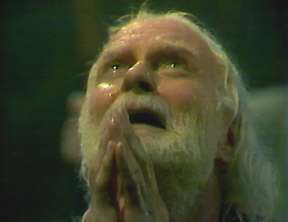
Read: the play and the Signet Introduction, and the articles by Mack, Bamber, and Brown
CLICK to go to the class on the play.
"King Lear in its Own Time: The Difference That Death Makes"
"Faires and Gods: A Socio-Religious Context for King Lear
EXAM
April 8 - King Lear
PBS Site on Ian McKellan's Lear
"King Lear Beyond Reason: Love and Justice in the Family"
"Performing the Bodies of King Lear"
(see "Introductory notes on Tragedy" links)
PAPERS DUE
Notes on Macbeth
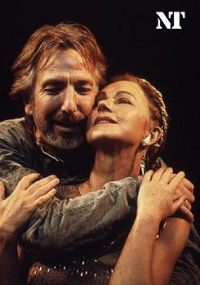
Read: the play and the Signet Introduction, and the articles by Danby, Adelman, and Novy
CLICK to go to the class on the play.
Plutarch on Antony and Cleopatra
"Roman Letters and Egyptian Performatives"
A Review of Janet Adelman's "Suffocating Mothers"
April 22 - The Winter's Tale
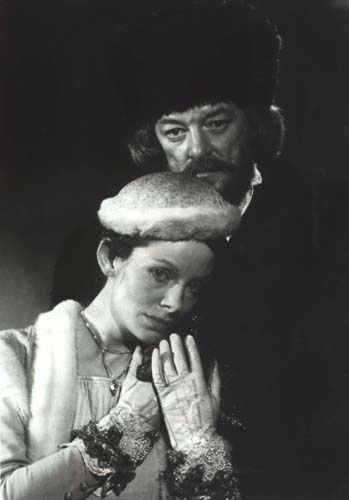
Read: the play and the Signet Introduction, and the articles by Tillyard, Knight, Neely, and Kahn
CLICK to go to the class on the play.
April 29 - The Tempest
(2 classes only)
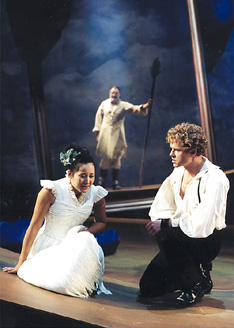
Read: the play and the Signet Introduction, and the articles by Knox, Leininger, and Greenblatt
Dante's definition of allegory
CLICK to go to the class on the play.
"Natural and Colonial Education in Shakespeare's The Tempest
FINAL EXAM: Monday, May 6 @ 11:30 am